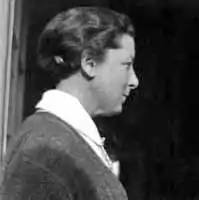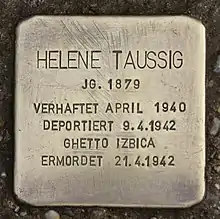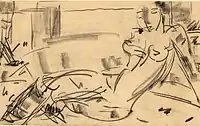Helene von Taussig | |
|---|---|
 | |
| Born | 10 May 1879 Vienna, Austria |
| Died | 21 April 1942 (aged 62) Izbica Ghetto, Poland |
| Nationality | Austrian |
| Known for | Painting |
Helene von Taussig (1879-1942) was an Austrian painter.
Biography
von Taussig was born on 10 May 1879 in Vienna, Austria.[1] Born into a prominent Jewish family, she was the fifth of 12 children.[2] In 1910 she traveled with fellow artist Emma Schlangenhausen to Oschwand, Switzerland where they studied painting with Cuno Amiet. From 1911 through 1914 von Taussig studied at the Académie Ranson in Paris. During World War I she served in the Red Cross on the Isonzo front. After the war she settled in the Anif area of Salzburg with Emma Schlangenhausen and Hilde Exner.[1]
In 1923 von Taussig converted to Catholicism.[2] In 1934 she moved into a studio designed by Otto Prossinger.[3]
Because of her Jewish ancestry von Taussig was deported to the Izbica Ghetto in Poland in 1942 where she died in on 21 April 1942.[1][2]
Legacy

In 2012 many of her paintings were returned to her heirs by the Salzburg Museum as part of the Federal Act on the Restitution of Artworks from Austrian Federal Museums and Collections.[4] The heirs subsequently sold eleven of the nineteen paintings back to the Salzburg Museum.[5]
von Taussig is memorialized by a stolperstein in Kirchenplatz, Anif, which was installed in 2014.[2]
Her work was included in the 2019 exhibition City Of Women: Female artists in Vienna from 1900 to 1938 at the Österreichische Galerie Belvedere.[6]
Gallery
 Dame mit gelbem Hut, 1920
Dame mit gelbem Hut, 1920 Aktstudie, 1932
Aktstudie, 1932 Der Tänzer Harald Kreutzberg, 1933
Der Tänzer Harald Kreutzberg, 1933
References
- 1 2 3 "Taussig, Helene (von)". Österreichisches Biographisches Lexikon und biographische Dokumentation (in German). 2003. Retrieved 3 July 2020.
- 1 2 3 4 "Helene von Taussig". Stolpersteine Salzburg. Retrieved 3 July 2020.
- ↑ "Helene von Taussig". Salzburgwiki. Retrieved 3 July 2020.
- ↑ "Provenance Research". Salzburg Museum. Retrieved 3 July 2020.
- ↑ "Der Restitutionsfall Helene von Taussig (1879–1942)". Salzburg Museum. Retrieved 3 July 2020.
- ↑ "City of Women". Belvedere Museum Vienna. Retrieved 3 July 2020.
External links
 Media related to Helene von Taussig at Wikimedia Commons
Media related to Helene von Taussig at Wikimedia Commons